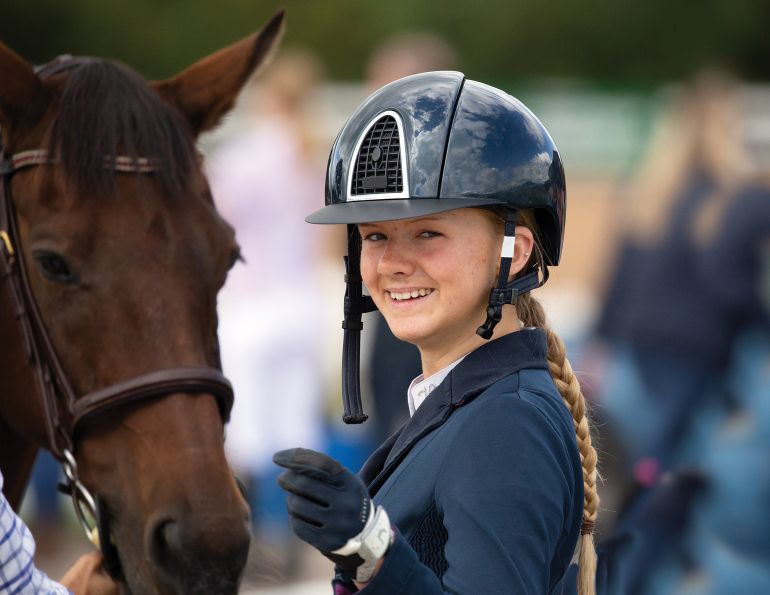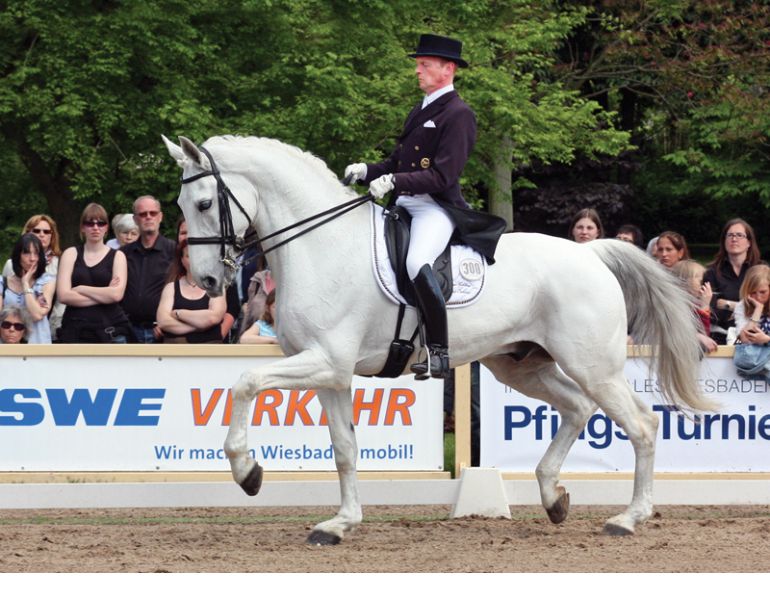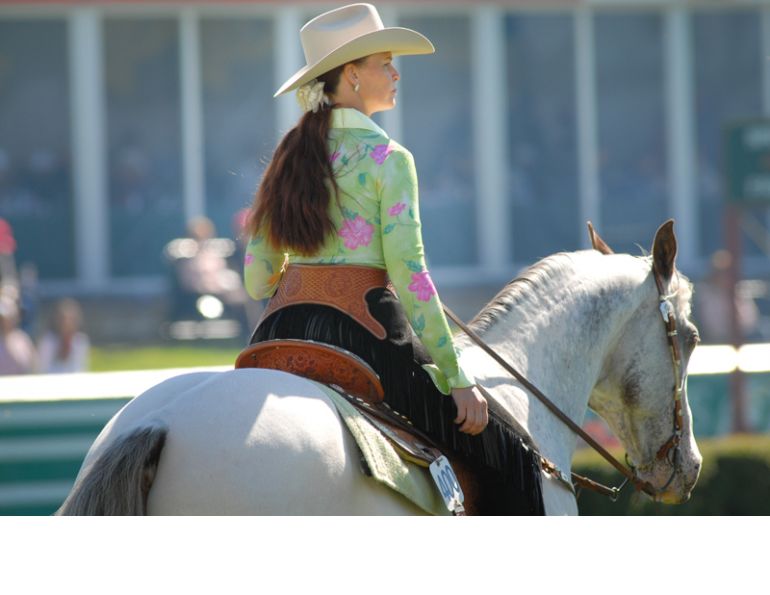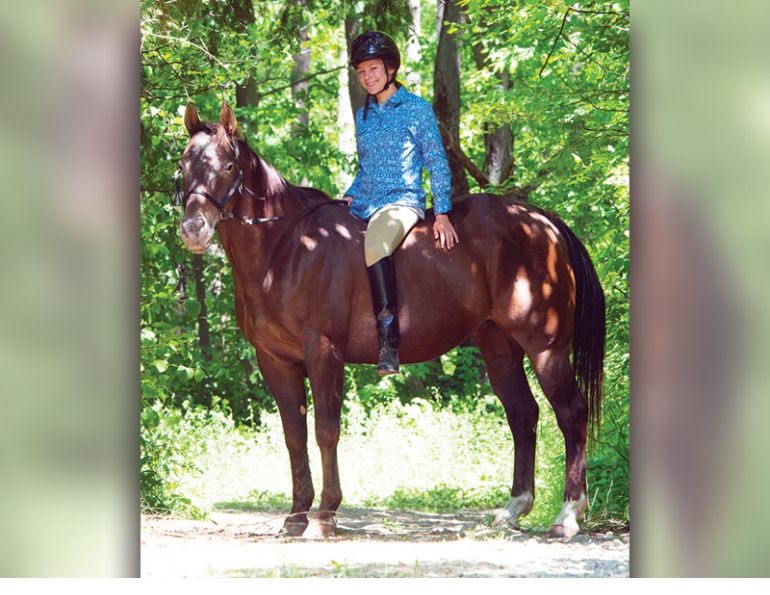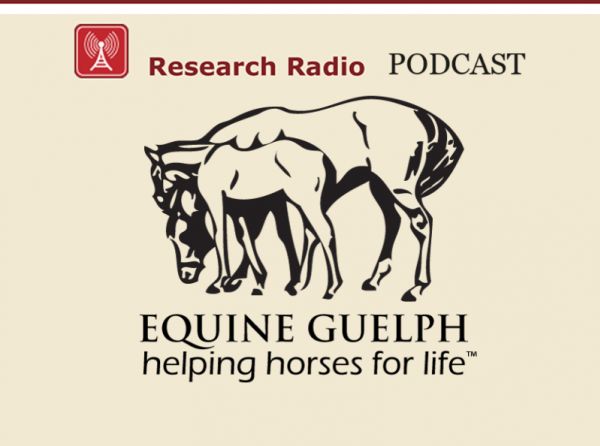By April Clay, M.Ed., Registered Psychologist
You walk into the ring and from the outside you’re looking pretty good with well-scrubbed tack, a freshly bathed horse, laundered riding coat, and boots so shiny you need sunglasses.
But on the inside things are a little messy. You’re feeling somewhat confused and overwhelmed. You can’t even remember what your intention was when you began getting ready this morning. Inside your head it’s like there’s a battle going on between a GPS and the worst backseat driver, and neither will win. You feel like making a run for it.
You are in desperate need of a mind makeover. Identify the parts that aren’t working and get some productive chatter going. With a little work it can be just as doable as putting together an immaculate turnout.
Bad Thinking Habits
Many of us perceive bad thinking as negative thinking: inner chatter telling yourself that you can’t do something, or creating nasty labels for yourself that you wouldn’t dare reveal in public. But bad thinking habits are different. They aren’t quite as loud, flashy, and obvious as our old friend the inner critic, but they can do just as much damage. Bad thinking habits are styles of thinking that shut down possibility and problem solving. They deplete your energy in insidious ways and infiltrate your riding pleasure.
See if you find any of the following thinking habits familiar, then make it your priority to clean out your mental closet.
Should
Many riders don’t see the initial problem with telling themselves that they should and have to do something. It can feel motivating to some, but as the sheer numbers of these kinds of statements accumulate, it can feel more like pressure.
“Not only did I think I should not have bad riding lessons or make mistakes, I thought my horse should always behave the way I wanted him to. And I do mean always,” said Dennis, a self-proclaimed perfectionist.
Not surprisingly, “should” thinking often goes along with perfectionism. After all, “should” is a way of stating an expectation in the most rigid way. If you tend to think this way, you also need to ask yourself whether you extend these statements to others.
Do you believe your horse, your coach, and your friends should behave a certain way? Do you often feel disappointed when they don’t?
Makeover: If you are feeling a lot of pressure from “shoulding,” there are a few fixes. One is to be a little freer or looser in your thinking. Instead of having rigid, impossibly high expectations, try adapting some flexibility. Encourage yourself to aim for a range rather than one acceptable outcome.
Dennis came to realize that good and bad days are necessary to training. He also expanded his definition of acceptable mount behaviour. “Now I really keep in mind that my horse is going to have good and bad and everything-in-between days. He will not be perfect, no matter how much I want him to be. He is no machine, and neither am I, so I decided to choose not to treat both of us that way.”
The second fix is one Dennis just described; it involves changing your “I should” to “I want to” or “I choose to.” This language shift will help you dissolve the pressure that goes along with the “should” habit. Instead of feeling like you are forcing yourself to do something, you will be refocusing yourself on what you have the power to choose.
What If?
“What if” thinking is the hallmark of the anxious mind: What if I fall off? What if I make a fool of myself? What if I can’t get my nerves under control? What if my pace is too fast? In the “what if” land of thinking, thoughts breed like rabbits. There is no end to the number of catastrophes your mind can dream up.
People who tend to think “what if” should practice thinking in the now, focusing on what is happening in the moment. A simple cue such as “what is” can change your thinking in a powerful way. Photo: Robin Duncan Photography
Kara has such a mind. “Especially just before a show, I can spend hours thinking of things that might go wrong. I usually don’t sleep well for the same reason. It’s like I want to get ahead of the game by thinking of how I could prevent all these things from happening. But, usually I just get exhausted.”
“What if” thinking is exhausting. It takes a lot of brainpower to keep up with the onslaught of possibilities. It’s also tiring as it is tied to the stress reaction and an overactive adrenal system. So no, that physical sensation of tiredness is not just in your head, it’s very much in your body.
Makeover: Practice thinking, “what is.” Every time you feel the urge to predict the future, bring yourself back to the present and anchor yourself there. This way, you will be dealing with what is happening in the moment and lower your overall sense of anxiety and doom and gloom. Chanting “what is” to yourself as your mantra when you are tempted to think ahead can assist you in staying in the now.
Kara adopted a slightly different twist for her mantra: “I decided to keep going back to ‘what now.’ I like those words; they feel calming and help me focus on what is directly in front of me. Sometimes I also use the phrase ‘ride your now horse’ to remind me of what is happening right now underneath me, not what I think could happen or might happen. A cue change has been very powerful for me”.
I’ll Try
There once was this strange looking little Star Wars guy who proclaimed “Try not. Do or do not. There is no try.” His name was Yoda and he was full of pearls of wisdom just like that one. Have you ever tried to pick up a pencil? You either do or you don’t. Usually when people say “I’ll try,” it’s a weak statement of intent.
Stephanie’s coach was the one who first caught onto Stephanie’s “try” habit. She kept hearing her say it again and again: “I’ll try to keep my leg on better;” “I’ll try to keep better control of my pace.” Her coach said, “I really started to see a definite pattern in Stephanie’s language. Whenever I would give her instruction on what to do in a lesson she would often respond with ‘I’ll try.’ Then a weak attempt would follow. I would reiterate the directions, and get the try thing again. I felt like pulling my hair out some days.”
Stephanie’s coach is right. A whole lot of “try” in your language usually signals doubt and apprehension. Typically there is a lack of commitment in whatever follows.
Makeover: Forget about trying. Commit to what you are doing. When Stephanie’s coach would give her instruction, she began to routinely say out loud, “I commit to getting those five strides,” or whatever the direction might be. It made her feel like she was attacking her task instead of shrinking from it.
“I love my new word, ‘commit,’” said Stephanie. “It makes me feel like I am really going after something. It also makes me think more about what I need to do to make it happen. I think before, I was just being more passive all around.”
Forced Positive Thinking
You heard me. I know you didn’t see this one coming. And no, it is not always counterproductive, but under certain circumstances it definitely can be. Faced with insistent inner negative dialogue, many riders and people in general resort to using affirmations. These are positive self-statements usually starting with “I am.” For example, “I am a gifted rider,” or “I am effective and capable.”
For some, this kind of self-talk works just fine. It boosts their esteem and resolve, resulting in good rides. But for others it can cause more heartache. What sometimes happens is the unconscious mind, having different beliefs than those being presented, starts to mobilize an argument. “What do you mean you’re capable? Don’t you remember your track record or do I have to remind you?” Some of you know all too well what direction this goes next. Your mind turns into a war zone and you spend far too much time trying to resolve the conflict instead of riding.
Another problem with trying too hard to make positive talk is the pressure it can generate. You try and try and don’t see quite enough results. This can leave you feeling even more negative about your chances than when you started.
Makeover: Instead of focusing on the positive or the negative, try the neutral. Task related talk involves a focus solely on what it takes to get the job done: “Light hands, eyes up,” or “Even pace, smooth corner.” For many athletes this approach is more effective and less stressful. Try it out and you’ll see your focus go from how you’re doing to what you’re doing. Even better, your results will look after themselves.
To read more articles by April Clay on this site, click here.
Main photo: Do you have bad thinking habits that get in the way of your performance and riding pleasure? Consider giving your mental closet a makeover.








